Peter MALONE
Saturday, 18 September 2021 19:21
Henry V/ 1989
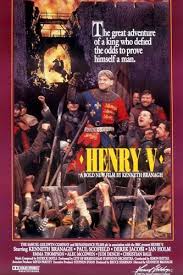
HENRY V
UK, 1989, 137 minutes, Colour.
Kenneth Branagh, Emma Thompson, Derek Jacobi, Brian Blessed, Alec McCowen?, Ian Holm, Paul Scofield, Richard Briers, Robbie Coltrane, Judi Dench, Christian Bale.
Directed by Kenneth Branagh.
Henry V is the work of the 28-year-old Kenneth Brannagh (The Boys from the Bush, A Month in the Country). A noted Shakespearian stage actor of the '80s, he was also a writer as well as an entrepreneur. His version of Henry V was inevitably compared with Olivier 45 years earlier. The Olivier version is patriotic, bright and heroic. While Brannagh's version is heroic, it is much more dark, focusing on the complexities of character of the king, the complexities of war and the ugliness of death. Both films stand as arresting interpretations of Shakespeare's play.
Brannagh is very good in the central role, quite a contrast to the rhetorical Olivier. In fact, he probably makes a more realistically credible Henry V. Brannagh has introduced some flashbacks from the Henry IV plays to give a brief picture of Falstaff and Prince Hal's relationship to the fat knight and his rollicking days. This highlights the contrast with his kingly bearing.
The film has an extraordinary cast of British stage stars led by Paul Scofield, Judi Dench, Robert Stephens. They bring to life the characters they play, even in small roles. Derek Jacobi is excellent as the prologue.
The film relies on close-ups for exploration of character. It also has dense interiors, stylised tableaux. For the battlefield sequences, the cast is small, nevertheless there is a picture of small-scale war, uncertain battles, brutality and bloodshed. There is a fine tracking sequence after the battle with a Latin hymn praising the glory of God which highlights the meaning of the war and the slaughter.
Brannagh has brought to life Shakespeare's play. He went on to direct Much Ado About Nothing, Hamlet (the full text) and Love's Labours Lost.
1.The impact of this version? The memories of Olivier? The status of Henry V in the film tradition?
2.The work of Kenneth Brannagh and his perspective: as producer, director, editor of the text? As actor and interpreter?
3.The use of the text, cutting some of Shakespeare's poetry? The using of excerpts from the Henry IV plays? The introduction of Falstaff? The poetry as spoken, the rhetoric and interpretation of the cast? The poetry and its drama, humour?
4.The visual impact of the film? Colour photography, style? Dark, rain, mud, blood? The re-creation of the 15th century, costumes and decor? Interiors and exteriors?
5.The editing and pace, the use of close-ups, psychological truth? The intensity of the drama? The tableaux? The tracking shots, especially for the battle? The editing of the battle sequences?
6.The musical score, its mood? The Latin hymn and its beauty, meaning, triumphant sound?
7.Audience knowledge of this aspect of English history? England and France? The rights and wrongs of the claims to the French throne? The sequence of the argument about the claims? The right, each side seeing God on its side?
8.The role of the prologue speaker, the introduction to the film, the film studio? His 1980s clothes? The poetry? His inviting the audience into the sequences? His continued reappearances? The credibility of the prologue speaker and the development of the drama?
9.Henry V and his past, his rollicking and reckless youth, Falstaff and company, drinking and gambling, play? The change? Henry's heritage, the English throne and its responsibilities? Banishing his past, banishing Falstaff? The insertion of the flashbacks and his memories? His regrets? Pistol and company in battle? Bardolph and his looting and his decision to hang him? Henry as an enigma?
10.Henry as king: close-ups, the ordinary man, his age, his behaviour in the court, his reaction against plots, execution of his friends who were traitors? The decision to go to France, to be involved in war, attitude towards war and battle? Valiant fighting? His relationship with the French emissary? Friendship with Exeter and relying on his nobles? The vigil and his walk through the camp, his listening to the men, arguing with them about their loyalties? The `Unto the breach, dear friends' speech in the heat of battle? The rhetoric of the St Crispin speech and his rousing rendition of it? The kingly ideal? The relationship with the King of France? Kate and the wooing? The humour? Order restored? The establishing of peace? Shakespeare's understanding of the role of the king, battle, God, divine right, divine order?
11.Pistol at the inn, the clash with Bardolph and co, the fights? The robberies during the battle, Pistol's tears at Bardolph's death? Bardolph and the hanging? The boy with them, sharing their adventures, the young boys in battle, their deaths? The king and his march with the boy? The memories of Falstaff? Falstaff's death? Mistress Quickly and her caring for Sir John, marriage to Pistol? Her farewell to Pistol? The news of her death?
12.The King of France, his claim to the throne, dignity, suing for peace? The ambassador and his manner, his being received with respect? His perspective on the battle? The Marshall of France and the involvement in the war? The Dauphin and his pride? The French noble, vaunting their power, their deaths?
13.Exeter and the English nobles, their loyalty, their vigour in battle? Their conquering? The English dead compared with the piles of French dead? The visualising of the battlefield after the war?
14.The role of the church, the opening with the discussion of the bishops, the bishops and the long explanation of the claim to the French throne?
15.The presentation of the traitors, the explanation of the disloyalty, in league with France?
16.Kate, the vigorous princess, her chaperone, the humour of her learning English? Henry wooing her, the play with language? Falling in love? The uniting of the kingdoms?
17.The film as an experience of Shakespeare's drama, the use of film techniques: close-ups and their effect, the vast sweeps, the camp, the battle sequences, the hanging, the dead on the battlefield, the carrying of the boy? A blend of pageantry and serious drama? An interpretation for the '80s and the late 20th century?
Published in Movie Reviews
Published in
Movie Reviews
Tagged under
Saturday, 18 September 2021 19:21
Heavenly Creatures
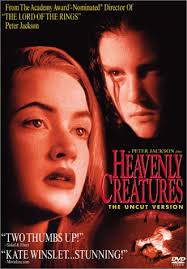
HEAVENLY CREATURES
New Zealand, 1994, 98 minutes, Colour.
Kate Winslett, Melanie Lynskey, Sarah Peirse.
Directed by Peter Jackson.
Heavenly Creatures is an arresting New Zealand drama, a re creation of a celebrated murder case of 1954. The film was co-written by Peter Jackson (director) and Frances Walsh, with whom he collaborated in his previous films: Bad Taste, Meet the Feebles and Brain Dead. Jackson was best known as a master of the splatter feature. However, he turns his skills to a more mainstream subject and makes a film which is creative as well as done with style.
The film focuses on two young girls at school in 1953-54. They are very well played by Melanie Lynskey and Kate Winslett (both of whom are introduced in the film). The film traces their friendship, their dependence on each other, their creative writing, entering into an imaginary world of their own, gradually intensely involved in this mad world which leads then to the killing of a mother.
The film is very stylish, opening with a newsreel travelogue of Christchurch in the '50s and then making the transition to real life, the violence lurking under the respectable surface of New Zealand. The film's use of Mario Lanza songs (an idol of the girls) is also very effective. Again there is use of The Third Man, especially Orson Welles as Harry Lime, a character entering into the fantasy of the girls. When the fantasy land is finally shown, it is the coming alive of clay figures that the girls have made and provides an excellent surreal counterpoint to the ordinary life of the girls.
There is a great deal of comment about New Zealand society, about the world of fantasy, about obsessive madness, about adolescent crushes and lesbian infatuations, of the exercise of power and the eruption of violence.
1.The critical acclaim of the film? The reconstruction of a crime and its background? A world of madness? Inviting the audience to empathise and understand?
2.A New Zealand true story, the opening with Christchurch and the travelogue, a beautiful and tranquil city? The instant transition to the reality of the murder? The value of examining the surface and under the surface of New Zealand life?
3.The Christchurch locations and the period re-creation? The Panavision photography?
4.Mario Lanza as the girls' idol, the use of his songs - in themselves, the clay figure of Mario Lanza singing in the fantasy, the collages used, especially with the "Donkey Serenade" as well as not being afraid of the dark and "The Loveliest Night of the Year"?
5.The background of the movie world of the time, James Mason, Mario Lanza, Orson Welles and The Third Man? The rejection of Welles and his going over the waterfall? His reappearing in the fantasy and pursuing the girls like Harry Lime?
6.Audience sympathies - with the girls, their parents? Understanding them? The nature of the fantasy and their absorption in it? Their obsession with each other? Moral issues?
7.The opening and the mood of the girls running, the horror of the death, the audience anticipating the murder throughout the film?
8.The credits and the atmosphere of the school for girls, wealthy girls, the style, the singing of the hymn, the assembly, the staff? The French and art lessons?
9.The contrast with the world of fantasy, Borovnia, the names of the characters, the girls entering in, their writing, creating? The genealogies? Their writing letters to each other in the names of the characters? The fantasies visualised as clay figures come alive? The happy fantasy land? The violence - especially of the son? The final sexuality? The girls entering and leaving this world? The castle and the proclamation of madness?
10.The portrait of Pauline/Yvonne? Not singing the hymn, plain, withdrawn, in the French class, her reaction to Juliet correcting the teacher? Alone in the art class? Admiring Juliet's work? The Mario Lanza record and listening to it? At home, pushing her parents? The growing friendship with Juliet? Playing with her - and the breaking of the Lanza record? Her age, infatuation with Juliet? The collage of their bike-riding and outing together to the Donkey Serenade? Her being at home with the Hulmes? The increasing of her writing, imagination, changing her name? Christmas presents and the gift of the diary? Her resolution? Her reaction to the guests? Her dreams and her dream world? Juliet's illness and the pain of separation, the writing of the letters, entering into the characters of their fantasy? The reuniting? Dr Hulme and his concern, Yvonne's mother taking her to the doctor, his interrogation, questions of homosexuality? Yvonne and her talking about suicide and imagining it? Being further withdrawn, alienation from her mother, her mother's lectures? Idealising the Hulmes? In bed, John and his advances, being caught by her parents, going to his house, the escapade, part of her imagination in Borovnia? The plan, wanting to eliminate her mother, the importance of the night with Juliet after seeing The Third Man, the pursuit by Harry Lime? The building up of their fourth kingdom, the film stars being saints? The night and imitating their encounters with the saints? The anticipation of the murder, the images of the boat and the separation from Juliet? The day of the murder, her rising, helping her mother, going for the outing, the brutality of the murder in the forest? The portrait of Pauline/Yvonne? Her becoming Gina? Making the character comprehensible?
11.The character of Juliet, her aristocratic manner, assuredness, correcting the French teacher, doing her own art, her creativity in art, writing and reading and telling her stories, telling the story at table, the plans for publication? The bond with Paul? The dependence? Playing with her brother, the breaking of the record? The background of her illness, going to the Bahamas, separation from her parents? The Donkey Serenade collage? Classes? Her illness, her parents going overseas, her having to go to hospital? Her unhappiness, writing to Paul? The visit, her recovery? Her boasting about her mother and her psychological work - then the discovery of the affair? Wanting to blackmail her for money? The divorce, the plans for the future, their reality and unreality, to South Africa with Paul? Harry Lime and the pursuit, the night with Paul and the making love to the stars? The lesbian overtones? Her getting the brick, farewelling her mother, going to the house, her participation in the murder? Portrait of Juliet? Understanding her?
12.The Reapers, the nice mother, the boarders, family life, worried about Yvonne going to the Hulmes? The growing concern, the visit of Dr Hulme, the mother taking Yvonne to the doctor, the questions of homosexuality? Yvonne's father, his mocking her with the fish microphone, bond, antipathy, not understanding? The growing antipathy, Yvonne seeing her mother as blocking her, the lectures, the exasperation? The preparations for her death, confiding them to the diary?
13.The Hulmes and their style, life, Mrs Hulme and her marriage counselling, the affair with Bill? The decision to separate after the trip overseas, the effect on Juliet, the honour at the university and their being together? The farewell to Juliet? Their being imaged in Pauline's mind as welcoming her into their family?
14.The portrait of the school, the headmistress, the various teachers? Pauline having to leave school, her typing lessons, earning her own living?
15.New Zealand in the period, real world, fantasy world, the royal family (and stories of fantasy about royalty)? The possibility of helping their daughters and controlling them, the possibilities of avoiding the disaster?
16.Imagination, horror, human behaviour, psychologically and socially bizarre behaviour? The girls not being able to sustain a plea of insanity?
17.The final information, the arrest, the diaries, the trial, release and separation? The overall impact of this exploration of a crime?
Published in Movie Reviews
Published in
Movie Reviews
Tagged under
Saturday, 18 September 2021 19:21
Heat
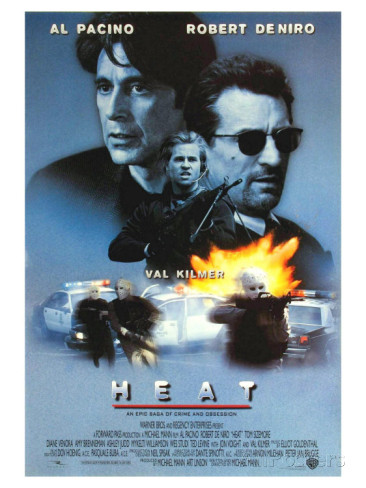
HEAT
US, 1996, 172 minutes, Colour.
Al Pacino, Robert de Niro, Val Kilmer, Jon Voight, Tom Sizemore, Diane Venora, Amy Brenneman, Ashley Judd.
Directed by Michael Mann.
When it is good, it is very good, but there are some flat patches in this very long police thriller. Technically, it is state of the art movie-making by Michael Mann (Last of the Mohicans and creator of Miami Vice), big-screen action, individuals larger than life and thundering action (especially a semi-automatic shootout in downtown LA which, on reflection is rather appalling).
The stars are larger than life, Al Pacino giving a sometimes literally booming performance as a stressed and obsessive police officer and Robert de Niro, sometimes ingratiating as a hardened criminal. Val Kilmer (forgetting Batman) is convincing as ruthless thug. The screenplay gives a human side to its characters which works well, with Diane Venora as Pacino's wife.
A strong action show with human touches, but alarming as well. Top stars, strong action.
1.The critical acclaim? The work of Michael Mann as film and television director and producer? Los Angeles police thriller? Action thriller? Psychological thriller?
2.The Panavision photography, Los Angeles settings, the city, the streets, the homes, the airport? The musical score?
3.The staging of the action set pieces: the bank robberies, the chases, the shootout in the middle of the streets, the airport finale?
4.The title and its focus, atmosphere?
5.The interaction between Robert de Niro and Al Pacino? Each being able to play the other part? The type of characters they personified? The law, the criminal, the various codes? The irony that they met only in one sequence during the film at the restaurant before the final climax?
6.Al Pacino and his intensity as Vince: his dedication to his work, total commitment, his detection skills? The erratic and irascible character? The background of his marriages? His stepdaughter and her tensions, his ability to relate to her? But her reliance on him and his absences? His wife and his keeping her out of his work? Not confiding, the reasons given? The contrast with his work at the police precinct, his team, collaboration? The erratic life of the detective?
7.Vince's wife, the quality of the marriage? Her strength of character, weaknesses? Drugs? The brittle relationship with her daughter? Her lifestyle, loneliness? Cooking the dinner and Vince's arriving home late? The ability and inability to talk? The marriage and personality problems? Her anger? Her having an affair, Vince's reaction? Her motivations, trying to get his attention? The daughter and the suicide attempt, the hospital? Discussions with Vince - a possibility of reconciliation?
8.Vince's stepdaughter, her age, adolescence, waiting for her father and desperate for him, becoming more and more neurotic with his absence? Vince and his support, driving her to school? The possibility of her trusting him? The suicide attempt, Vince taking her to hospital, his care for her?
9.Themes of work, family, pressures? The other members of the team, their personalities, skills, collaboration?
10.The contrast with Robert de Niro as Neil? Personality type, his background? His quiet manner? His criminal skills? His connections? His relationship with the mastermind dealer and the supplying of information? The building up of his team, their clockwork precision in action, his ruthless treatment of them - even to execution? His personal life, meeting the woman at the bar, talking to her, relating - passionately? The division between his two worlds? His needs, not telling her the truth? The danger? Her gradually seeing what his life was like, her loyalty to him? His interest in her life, her work? The quality of their relationship and his hopes from it?
11.Neil and his going into action, the skills and the timing, the trucks, the shooting? Loose Fingers and the naming for the police? Escape?
12.Giving information to the police, names, connections, following?
13.The older mastermind and information-giver? John Voight and his style and manner? Setting up the deals, the contacts, helping with the final escape?
14.The plan, the team, the execution of the robbery, the pursuit of the police, the shootouts in the Los Angeles streets, the danger? Neil's detachment and involvement - the deaths?
15.Vince and his following the leads, working with his team, following Neil - and their being led on and tricked by Neil? Neil on the top of the building and looking down at them?
16.Chris and his wife, his gambling habit, his needs? The child? His ruthlessness and brutality in action? Character, truth and lies, his affluent lifestyle? Participation in the action? Relationship with Neil? His being wounded, going to the hospital, the vigil with his wife, the police and the offer of protection, the deal? The car and his being identified? His refusal, the escape? The character of his wife, her love for Chris? Her place in the deal, the phone call, giving him the sign at the window and allowing him to escape?
17.The gangs and their styles, the bonds, life and death? The businessman and his associates, the job, the swindle? His fear, the home attack and his death?
18.Themes of violence in American society, the gangs and violent robbery, deaths? The relationship between brutality and sexuality? The minor gang members as thugs, their sexual violence and brutality? The information given to the police and their pursuit?
19.Neil and the build-up to the climax, his girlfriend, the escape? The discovery of the man who betrayed them? His going to pursue him in the hotel? The irony of Vince at the hospital with his stepdaughter and her suicide attempt? Neil having time, eluding the guards, killing the informer? The build-up to the confrontation between the two men, the spectacular chases through the airport, their first meeting and discussion in the restaurant and toying with each other? The final violent confrontation and Neil's death?
20.The tradition of the American action thriller, the police thriller? Urban concerns and violence? Personalities caught up on both sides of the law? Codes? Audiences caught up in the act ion - but also offered understanding?
Published in Movie Reviews
Published in
Movie Reviews
Tagged under
Saturday, 18 September 2021 19:21
Heartsounds
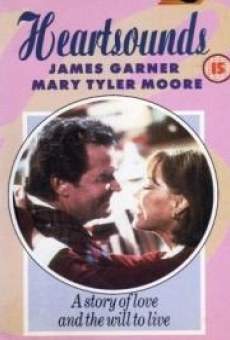
HEARTSOUNDS
US, 1984, 127 minutes, Colour.
Mary Tyler Moore, James Garner, Sam Wanamaker.
Directed by Glenn Jordan.
Heartsounds was one of the acclaimed telemovies of the middle '80s. Directed by Glenn Jordan, director of many effective telemovies, stars Mary Tyler Moore and James Garner give very effective performances. The focus is on Martha Weinman Lear's coping with the series of debilitating heart attacks that her husband, a doctor, suffers. The film is relevant, especially to audiences in First World countries, with its focus on stress and the consequent heart disease and attacks. It also focuses on operations, hospitalisation, convalescence. It highlights the strong relationship between husband and wife and the mutual support.
The stars give very strong performances and the film is very emotional.
1.The impact of this telemovie? For the television audience? For different aged audiences? For those who have experienced heart disease? For those who have cared for heart patients? The film offering information, education, inspiration and support?
2.The American telemovie background? A world of affluence? Audiences identifying with the lifestyle, the characters? The city, the professional world of medicine? Money, family? The musical score and soundtrack?
3.Martha Lear and her book, bestseller, her experience? Mary Tyler Moore and her interpretation of Martha Lear? The wife's perspective on what led up to the attacks, the treatment and convalescence?
4.James Garner as Hal Lear: the doctor, his work and skills, his instructions, his dealing with people, instruction? Age, his marriage and its quality? Family? His collaboration with colleagues? The film's dealing with the heart attacks themselves, visualising the attacks, the heart sounds, audiences being empathetic to the experience of the attacks? The phone calls, the desperation? Martha and her support? The doctors and their points of view? Operation, recovery, convalescence? The diagnosis? Further experience and experiments? The nature of convalescence, time, not doing anything? The support of family? Holiday? Moe? The hospital and the lack of attention? Hal almost dying? The personal dimensions of the heart attack and the experience? The dark, smoke, sex...?
5.Martha, her professional life, skills, interactions with people, the magazine, her writing? The years with Hal? The quality of their relationship? Memories? The experience and her anxiety? The return, the vigil? Smoke? Writing `Heartsounds'? The repercussions with family? Moe? Her desperation at the hospital? The operation, her angers?
6.The film's perspective on doctors? Their skills, work, experience? Good doctors? Inadequate doctors? Moe? The role of doctors in support and reassurance of patients and family? The perspective of the film on the medical profession, good and bad?
7.The film's perspective on family, husbands and wives, mothers and fathers, children, grandchildren? The networking of families? The possibilities for support?
8.The film as an educational story about heart illness and experience? The possibilities of death? Debilitation? Treatment? The film's cinematic way of helping audiences to realise the reality of heart disease and to experience it?
Published in Movie Reviews
Published in
Movie Reviews
Tagged under
Saturday, 18 September 2021 19:21
Heart of Dixie
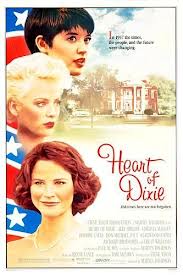
HEART OF DIXIE
US, 1989, 95 minutes, Colour.
Ally Sheedy, Virginia Madsen, Phoebe Cates, Treat Williams.
Directed by Martin Davidson.
Heart of Dixie is the story of a young girl from the South, Alabama, in the late '50s. She looks more critically at her environment, the presuppositions about growing up white, successful marriages and families, and the contrast between the experience of blacks and the need for social justice. She is a writer and opts then for a writing career in New York City.
The central character is played effectively by Ally Sheedy. In support are Phoebe Cates and Virginia Madsen as well as Treat Williams as a photojournalist who befriends her.
The film re-creates the atmosphere of the South, its genteel racism, the violence against blacks. It also places these events in the period of the emergence of Elvis Presley as an entertainer, showing racial violence erupting at a Presley concert.
The film offers a portrait of young people at the time, their expectations and the futility of this closed wealthy life of the aristocracy. It highlights the contrast with more enlightened views and a broader approach to life.
The film is conventional in its style, but appeals to a wide audience - offering them reflections on youth, growing up and issues of racism.
1.The film as a memoir, young people in the '50s, ideals, the smashing of ideals, change, the breaking of racist attitudes?
2.Alabama settings, the atmosphere of the '50s, visual style, manners, decor, clothes? The world of the university, of mansions? The contrast with the black townships? The musical score, the songs - of the '50s, of Elvis?
3.The title and its focus, the changing heart of the South during the 19th and 20th centuries?
4.The film as Maggie's story? Ally Sheedy in the central role? Her strength and character, her drive? Her place at Randolph? With the other girls? Her relationship with the black servants, friendship, learning from them? The fraternity, their lifestyle, talk? Her friendship with Delia, with Acken? Sharing their lives, study, social? Going out to the topless bar? The role of boys: Tuck, Hoyt, talk? Friendships, clashes, fights? Maggie and her trying to save her friends? An attractive and sympathetic character?
5.Maggie with her friends, Acken and Green? Pregnancy, the dance, the discussion? The friendship but her opting out of Randolph? The advice for Maggie? Delia and her ambitions - and lack of ambitions? The friendship with the boys: Tuck, Jinx? The outings? The card game and Delia being disregarded by the boys, the clash? The accident and its effect on all of them? Boots and his family? Hoyt and the judge?
6.Maggie and the writing of the article, her challenging style, the questions raised in her own consciousness? The importance of the Elvis concert, her observing, the blacks, the eruption of the violence, the brutality of the whites? The photographs? Her alarm? Discussing with the photographer, her sentiments against him and his exploitation - his showing her the photos and her change of heart? Going to see the woman in the black township? The writing, the support from Tuck? The meeting with the board, the dean, discussions about her attitudes, her writing? Her being ousted from Randolph? Her stances?
7.The girls, Delia and her type, her family, Daddy? Her aloofness from the blacks, from the social questions? The questions of integration? Her concern about being Honeysuckle Queen, Belle of the Ball, the plan for the marriage? The card game, her accepting her place? The accidental death and its effect on her? The discussion in the fraternity and her asserting herself? Her relationship with Boots - and the prospect of the marriage?
8.The Honeysuckle Queen - the place at Randolph of these institutions, the old-fashioned attitude towards women? Delia and her grief, her winning, her speech? Her reading of Maggie's article - and her reaction? The possibility of change or not? Her marriage and her future?
9.Acken, her place in the school, friendship with Maggie, pregnancy, dropping out? Advice?
10.The girls in the fraternity, discussions about sex, going all the way? With the boys, the boys and their sex preoccupation, serenading the girls? The styles of college life?
11.Treat Williams as the photojournalist, his coming to the school, his knowledge and background, his friendship with Maggie, going to the Elvis event, taking the photographs, showing them to Maggie, her change of heart? Supporting her in her going to New York? Their attraction, relationship?
12.Boots and his type, attitudes towards women, flirting? The judge? The visit to the house - and Maggie and her talk, making a bad impression?
13.The judge and his wife, the discussions about the South, the role of women, race issues - and his discussions with his black servant and asking him if he was under threat?
14.The portrait of the blacks, knowing their place in this society? Servants in the mansions? Servants at the school? The black township, Maggie's visit, the farewell?
15.The background of Elvis Presley and his emerging from the South, his musical style? The following amongst the teenagers? The frenetic dancing and singing? The violence erupting at his performance?
16.The themes of integration? The university background? The role of the dean? The governor? The hostility of the people, the students? The black student and her attending the university? Maggie's help?
17.A look back at the '50s and attitudes in the South from the perspective of the '80s?
Published in Movie Reviews
Published in
Movie Reviews
Tagged under
Saturday, 18 September 2021 19:21
Hawks
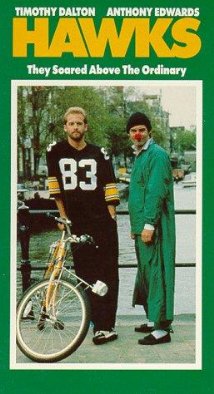
HAWKS
UK, 1988, 107 minutes, Colour.
Timothy Dalton, Anthony Edwards, Camille Coduri, Sheila Hancock, Jill Bennett, Connie Booth.
Directed by Robert Ellis Miller.
Hawks is a black comedy about dying - with a touch of sentiment. Timothy Dalton, sounding very aristocratic but not behaving so, is an English cancer patient. Anthony Edwards is an American with cancer. They meet in hospital. In their interactions, layer Dalton encourages football player Edwards to make the most of his final weeks. This involves leaving hospital, combating Edwards' suicidal wishes, going to Amsterdam to visit a brothel, encountering two English girls. It also shows the effect of death and friendship.
The film is peppered with sex references which might alienate some of the potential audience. However, it is very difficult to make a comedy about dying that is acceptable and the reviews of the film were generally very unsympathetic. However, it is an interesting attempt to try to dramatise the situation, give some insight - especially for people of ordinary (often very ordinary) values and stances where death makes a difference to the perspective. There is a very good English cast in support. Direction is by American Robert Ellis Miller (The Heart is a Lonely Hunter, Any Wednesday, The Girl from Petrovka).
1.Impact of the serious comedy? Death and dying? The sexual perspective? Hostile critical reaction to the film?
2.London settings, Holland, Amsterdam? Musical score?
3.The title and Bancroft's explanation, Hawks soaring, soaring over the ordinary pigeons?
4.The introduction to Demerchensky? The Saab dealer, his patter, going for a ride, the reckless drive, the suicidal rush at the cliff? Demerchensky's attitude towards his illness, to death? Contemplating suicide, Bancroft with him on the roof, wheeling him over the edge and the short drop? His realisation that he still wanted to live?
5.The presentation of illness, the cancer ward, the atmosphere of the hospital? Bancroft and his interaction with Demerchensky? The puzzle of a terminal illness? The putting on of the red nose? Jokes? Bleak and black jokes? Visits to the roof and leaving Demerchensky there? Going out to dinner and the reaction of the diners? The ambition of going to Amsterdam, facing dying? Relationship with the nurses, the doctors, fellow patients and the dead man in the ward, the visit to the morgue and the oath?
6.Timothy Dalton's style as Bancroft, lawyer, rhetorical speeches, cynical, nose, his range of defence mechanisms? With the staff? His going out, onto the roof, his behaviour at dinner, Demerchensky's attitude towards suicide, the oath in the morgue? His love for Carol, going to visit her before going to Amsterdam? Crashing the wedding? The sobering talk with her father?
7.The decision to go to Holland, Demerchensky and his not wanting to sit in the chair, leaning on the bike? Driving the ambulance, the encounter with Hazel and Maureen, the hitching of the car? Their plans? Their going to the brothel, the reaction against it, leaving? Meeting Hazel and Maureen, talking things over, the truth about their illness? Demerchensky's night with Maureen? The problem of the pregnancy and finding the husband? Their decision to take the girls - and Hazel as the victim of deception?
8.Hazel and her awkwardness, dropping the bag in the river, friendship with Maureen, telling her about the pregnancy, the decision about the trip to find the father, in Holland, talking and being understood by Bancroft and Demerchensky? The towing? The reaction to the men going to the brothel, their clothes, the visit to the brothel and their not finding them? Spending the night and their reactions? Hazel and her attraction to Bancroft? Going to the father of the baby, finding he had a family, feeling foolish?
9.Demerchensky and his background, his trying to cope with the illness, weakness? The effect of Bancroft's friendship? The effect of the visit to Holland, Maureen? His final illness, the Dutch doctor? Bancroft spending the time and energy caring for him? The pathos of the moment of death? The strong bond of friendship?
10.Bancroft and his illness, to death or not? His defences, honesty and lack of honesty? His reaction to Hazel? Writing to Cal? The build-up to the wedding day, the chair for Demerchensky as best man? Marrying Hazel?
11.The perspective of dying on values and drives, friendships and support, the drive to live, the sexual drive?
12.A film of insight? Humour? Or not? Or merely a black comedy in bad taste?
Published in Movie Reviews
Published in
Movie Reviews
Tagged under
Saturday, 18 September 2021 19:21
Haunted Summer
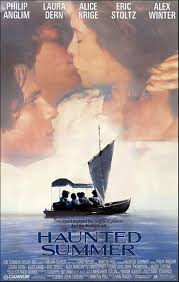
HAUNTED SUMMER
UK, 1986, 106 minutes, Colour.
Eric Stoltz, Laura Dern, Philip Anglim, Alice Krige.
Directed by Ivan Passer.
Haunted Summer is set in 1816. It is a short focus on the interaction between Byron and Shelley, Clare Claremont and Mary Godwin. (This episode was filmed in the previous year by Ken Russell, in his flamboyant style, as Gothic.)
The film's director is the Czech Ivan Passer, director of a number of offbeat films in the United States since the '70s including Creator and, especially, Cutter's Way. The cast is a mixture of British and Americans. However, the location photography was done in Switzerland and captures some of the romance of Switzerland in the summer of 1816. Costumes and decor build the atmosphere of the period. The photography is by noted Italian photographer Giuseppe Rotunno. Music is by Haydn and songs by Orlando di Lasso. The screenplay is by Lewis John Carlino, the writer-director whose credits include The Sailor Who Fell From Grace With The Sea, The Great Santini, Class.
1.The title, memories of the past, ghosts? The characters, imagination, passion, monsters, the British heritage of poetry and art?
2.The colour photography, the beauty of Lake Geneva? Costumes and decor? Sense of period? The classical musical score?
3.The background of the 19th century and its beginnings, after the age of reason, the romantic revolution? Conventions and morality? Disregard of conventions? Emphasis on emotion, freedom, the heart instead of the head? The breaking down of inhibitions? Drug-induced consciousness? Sanity and madness? Social, emotional, literary, psychological revolutions?
4.The status of the characters and audience knowledge of them? Their celebrity? Enhanced by their reputations? In real life?
5.The history of the period, the social and literary backgrounds? England and the British going on the grand tour of Europe? Switzerland? Youth at the beginning of the century? Relationships? Quests, interactions? The results?
6.The portraits of Shelley and Byron? Their status as poets, their reputations, reviews, popularity? Seen as seers of the century? Romantic ideals? Revolutionaries - of the mind? Their youthfulness, acting as boys, especially Shelley? Shelley and the goodness of human nature, ideals? Byron and the evil essential in human nature, cynical? The interaction between the two, jealousies and rivalries? The growing friendship, the envy and the relationship with Mary? Sharing the experience and strength of Mary? Healed or harmed by this haunted summer?
7.Shelley as an engaging young man, boyish, the ride in the coach, frolicking in the water naked, the pips in the dowager's collar, playing games? His relationship with Mary? Clare and her presence on the holiday? The holidays, riding the coach, going to the mansion? Conventions and breaking with conventions? His eagerness? Taking laudanum to expand consciousness, Byron and the experience of opium? Byron's intentions, Shelley's experience, not losing his innocence? The growing friendship, the challenge? Mary protecting Shelley? His understanding Byron? Sitting on the shore, the final encounter? The results of the experience, his short life afterwards?
8.The contrast with Byron and his reputation, the way that he was presented - and the echoes of people thinking him diabolical? His relationship with Polidori - despising him, using him? Understanding him? The explanations of his life, his poetry, relationships? His pessimistic view, evil as essential in human nature? The clashes with Mary? His relationship with Clare, having left her in London, her humiliation? The confession of the pregnancy, his reaction, his demands about the child, his sister Augusta looking after the baby? His opium experiments? His envy of Shelley's innocence, the clashes with Mary and the challenge? His fears, the monster in the night, Polidori kissing him? The result of his intervening in Shelley's life, in Mary's affections? The sexual encounter? His reaction, leaving for Greece? The values that he stood for?
9.Mary, her relationship with Shelley, love for him? Protective and caring? Her feminist views? Her writings (and audiences knowing that she wrote the Frankenstein story)? Her relationship with Clare, friendship? The going to bed and the three of them comforting each other? Her reaction to Byron, attracted yet hostile, protecting Shelley? The opium experiment and her being intended as the victim? Shelley still loving her? The confrontation with Byron, telling him the truth? Her compassion and the sexual encounter?
10.Clare and her relationship with Mary, accompanying her on the holiday? Her being abandoned by Byron? Her love for him? Contriving situations but failing with Byron? Observing the three, not understanding? Her confessing her pregnancy to Byron, his callous reaction? Her being on the outer? And her departure?
11.Polidori, his background, writings, secrets, homosexual dependence on Byron? Following Byron, the deals with the publisher? His being banished? The realistic and symbolic being a monster for Byron?
12.The background atmosphere of Switzerland at the period, the coachman, the guests in the hotel, the staff in the mansion?
13.Recapturing the world view of the romantic poets of the 19th century. Portraits, themes, literature and art, philosophy and life?
Published in Movie Reviews
Published in
Movie Reviews
Tagged under
Saturday, 18 September 2021 19:21
Harriet the Spy
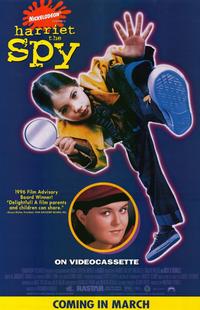
HARRIET THE SPY
US, 1996, 101 minutes, Colour.
Michelle Trachtenberg, Rosie O'Donnell, Eartha Kitt.
Directed by Bronwen Hughes.
According to the media kit practically every American has read the 60s children's book, `Harriet the Spy', and loved it. And the movie version has proven to be popular with both young and middle-aged. Harriet is a bright child who writes down all her observations - but they get out and her critical comments on her friends lead to her experiencing `welcome to the dollhouse' persecution. But she has to learn to apologise and value her friends. In this she is helped by her somewhat Mary Poppins like nanny, Rosie O'Donnell. Michelle Trachtenberg makes a credible Harriet. The film is an entertainment for young girls - with a message.
1.An American children's classic? Adaptation for the screen?
2.Audience response, adults, children - different reactions of boys from those of girls?
3.The credibility of the plot - the blend of reality and fantasy? The work of a young girl and her observations so that she could be a writer?
4.The portrait of Harriet: a girl of eleven, at home, with her friends, her experiences, the decisions to observe people, write them down and become a writer? Her friendship with Janie and Sport? Her notes, the spying? Her relationship with her parents - and their being busy? Her having a nanny, Ole Golly? The advice from Ole Golly and the encouragement in her writing? The nanny's observations and inspiration for Harriet? The clash with the parents and the nanny, her leaving, the effect on Harriet? Marion and her reading of Harriet's notes in class? Janie and Sport being hurt? Her becoming an outcast? The attitude of the teacher? Her decision to get revenge on those who were hurting her? The petty revenge - and the detail? The parents' concern, sending her to a psychiatrist? The visit from Golly and her effect? Her attempts to apologise to her friends? Her chance to look again at the various people she spied on, misinterpreting their lives, what she observed as only part of their stories? Her reinstatement, her volunteering to become the editor of the paper, the sharing of her stories with her readers?
5.Rosie O'Donnell as Ole Golly, the nanny in such a household, helping Harriet, inspiring her? Her eccentric style? Her boyfriend, George? Coming home late with Harriet, the clash with the parents, her decision to go away and leave Harriet to grow up by herself? Her return and helping Harriet in her crisis?
6.Harriet and her friends, Janie and Sport? Their being together, discussions? The hurt when Marion read out the observations about Janie and her experiments, Sport and his father, the writer with no money? Their spurning her? The reconciliation?
7.Marion Hawthorn, the leader of the class, the clashes with Harriet? Her getting the notebook, reading it, reading it out loud? Marion organising the club and the persecution of Harriet? Harriet's revenge? Marion and her own difficulties in her family?
8.The people Harriet spied on: Golly's boyfriend, George? As Golly's boyfriend? Seeing him take the vegetables? Interpreting him as a thief? Looking further - and his distributing the food to a poor family, his employer's agreement with this? The Chinese grocers, the arguing with the family, borrowing the truck, the differences between cultures of son and parents? The cage-maker, singing the blues, the clashes with the officials about his cats? Mrs Plummer, shut in, her eccentricities? Harriet and her having to change her perspective on people?
10.Sport's father, the writer, his house, his poverty, Sport and his relationship with his father - but ultimately the author selling his book?
11.The glimpse of Harriet's parents - the father as a television writer, social life, the clash with Golly? Sending Harriet to a psychiatrist? Trying to understand her better?
12.The atmosphere of the school, the teacher, the students? Harriet and her neighbourhood? The film's attention to detail of the supporting characters?
13.The popularity of the story, encouraging youngsters to be literate, to read, to write creatively?
Published in Movie Reviews
Published in
Movie Reviews
Tagged under
Saturday, 18 September 2021 19:21
Hard Way, The
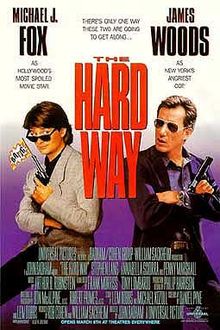
THE HARD WAY
US, 1991, 111 minutes, Colour,.
James Woods, Michael J. Fox, Annabella Sciorra, Stephen Lang, Penny Marshall, Christina Ricci.
Directed by John Badham.
The Hard Way is a tongue-in-cheek action show. It is an enjoyable star vehicle for James Woods and Michael J. Fox, each playing their expected type with the ironic contrast between the two. Woods plays his intense policeman. Fox plays the lightweight Hollywood star, star of a series called Smoking Gunn 2. When Fox is asked to be a star in a police thriller, he goes to New York and is placed under Woods' protective care while he is investigating a serial killer, the Party Crasher.
The film does well with the contrasts between the two ways of life - parodying the film world as well parodying the police world (while getting the maximum benefit out of car chases and action sequences).
The film has a good supporting cast with Steven Lang as the Party Crasher, Annabella Sciorra (in an early role) as Woods' girlfriend. In the supporting cast are Christina Ritchie as Bonnie, Penny Marshall as Angie the agent and Kathy Najimy as the film star's assistant.
The New York settings are well used and the overall effect is a satisfying Hollywood entertainment. Director John Badham made such films as War Games, Blue Thunder and Short Circuit in the early '80s. He then moved to action adventures like Stakeout, Another Stakeout, Bird on a Wire, The Drop Zone. (His earlier films had a wider range: Saturday Night Fever, Dracula.)
1.The entertainment value of police thrillers? Parodies of the movies? Putting them together in one film?
2.The stunts and action in widescreen style? The New York settings? The musical score?
3.The title, police and their work, the hard work of acting? The two stars working together?
4.Michael J. Fox's style as Nick Lang? The background of Fox and his film and TV work? His appearance and persona? The billboard in Times Square? The movies, the trailer? The world of film? His image? Spoilt? Life in Los Angeles? The discussions with his agent? Hopes, the part in the police thriller? TV and imitation? Arrival in New York, the moustache? His glib style? The police chief being a fan? With Moss? The clash between the two? Action, the ghetto, mistakes? The meeting with Susan, the pizza, the escort? Handcuffed, the escape? Dinner, the subway? The heroics? The growing friendship with Susan, saving her? The two ways of life, talking with Moss, change of attitude? The set-up and his thinking he had killed someone? Leaving, his conscience, returning? The crasher? His involvement, the cinema, the car, television and the finale? His movie? Michael J. Fox and playacting, comedy, serious?
5.The contrast with James Woods as Moss, the NYPD? His personality, nervous energy? His speed of action, the chase? The Party Crasher and the killing at the disco? The truck at the door? His relationship with Susan, standing her up, the job, her anger, his anger? The ghetto and his work being spoilt? The information about the Crasher? The gun, the set-up, the siege? The failure? The pizza? Subway, tough? The decision to set Nick up? His return? The chase, the cinema, the irony of the ending and Nick modelling himself on Moss for the movie?
6.Susan and her daughter, tough, nice, her attraction towards Nick? The subway? The danger, the rescue? The truth? Staying?
7.Themes of police and authority? The background of buddy movies, partners? Playing on the themes, the irony? The picture of the police precinct?
8.The Crasher and his style, the dare, television and Moss, the gun, the siege, the cinema, the crash and the car? The finale on the billboard in Times Square? His death?
9.The background of New York violence, guns, gangs?
10.The contrast with the world of Los Angeles, Hollywood, agents? Lang's Girl Friday?
11.An enjoyable mockery of movies - with the serious tone? Flip as well as action? Humanising the action show?
Published in Movie Reviews
Published in
Movie Reviews
Tagged under
Saturday, 18 September 2021 19:21
Halloween Resurrection
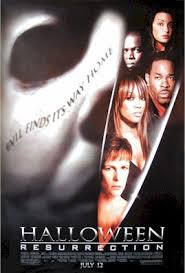
HALLOWEEN RESURRECTION
US, 2002, 86 minutes, Colour.
Busta Rhymes, Bianca Kaljich, Thomas Ian Nicholas, Ryan Merriman, Sean Patrick Thomas, Tyra Banks, Jamie Lee Curtis.
Directed by Rick Rosenthal.
Halloween Resurrection is the eighth Halloween film, starting from John Carpenter's classic in 1978. The characters are still very much grounded in the first film, Jamie Lee Curtis making an appearance (a final appearance) as Michael Myers' sister Laurie. Jamie Lee Curtis looks particularly haggard in this film, staying in a mental institution after her attempt to kill her brother in Halloween H20. However, she is killed off by Michael in this film.
The film was directed by Rick Rosenthal, who directed Halloween 2. He also appears as the professor, discussing the psychology of Jung and the nature of the Shadow.
The film uses internet screenings and text messaging for its plot. This was done in the British film, My Little Eye, where a group going into what seemed to be a haunted house were successively killed. All screening on the internet. This plot has an enterprising producer, rap singer Busta Rhymes, getting a group of six to go into the Myers house and to film it, each with their own camera. However, of course, he does not know that Michael Myers himself is about and goes into the house to kill off the investigators - with the exception of Busta Rhymes himself and a girl played by Bianca Kaljich. Sean Patrick Thomas (Save the Last Dance) guest stars as one of the victims.
The film follows the usual trends, is a touch less brutal than some of the others. However, it shows young people with their addiction to the internet, actually leaving a party so that they can all watch the Halloween experiment. Naturally, there is a computer geek who is able to text message to the heroine and save the day.
1. The popularity of Halloween films for a quarter of a century? Michael Myers, the horror, the various updatings and inventiveness?
2. The town, the house, the hospital? Audiences able to identify with the characters, places and situations? The atmospheric score?
3. The title and its implications? The presumption that Michael Myers would ever die?
4. The opening, Laurie in the institution, not speaking, the visualising of the past events, the mask on the policeman and her killing him? Her being given the pills, her not swallowing them? Her seeing Michael in the grounds, his coming to her room, the confrontation? Her trying to kill him, over the side of the building, his killing her?
5. Audience familiarity with the Michael Myers story? The recapitulation and visualising at the beginning? The internet program and its presumption that audiences wanted to watch Halloween stories?
6. The young people, their studies, the cook, the group coming to the kitchen and saying they had been chosen for the internet program? Sarah and her hesitation? The others eager to go?
7. The organisers of the program, making money out of the situation, interviewing each of the six on tape and their reasons for going into the house? Their setting up frights in the house? The leader going in, disguising himself as Michael Myers? The irony of the real one being there? The confrontations, the death of the woman, the wounding of the man?
8. The group: three men, three women? Their personalities, their characters? In the house, the frights, their ambitions to be on television and to be seen? Exploring, relationships, sexuality? The two young men and their being killed? The African American cook and his being impaled? The two young women and their deaths?
9. Sarah, her relationship with Deckard? In the house, her fears, the producer of the program? The fright with Michael Myers, being chased around the house, discovering the dead bodies, the roof? Her getting information by text? Her being saved?
10. Deckard, his friends, on the computer, the internet, communications? The party, the young people watching the program on internet? The fears, giving information to Sarah, her being saved?
11. Michael Myers, seemingly dead? In hospital? Opening his eyes? The popularity of this kind of horror film, scares, imagination of a serial killer, the mask and the myth?
Published in Movie Reviews
Published in
Movie Reviews
Tagged under